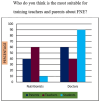Indian teachers' and parents' perceptions and experiences of food and nutrition education in primary schools: mixed-method study
- PMID: 40843196
- PMCID: PMC12365520
- DOI: 10.3389/fnut.2025.1635389
Indian teachers' and parents' perceptions and experiences of food and nutrition education in primary schools: mixed-method study
Abstract
Introduction: Food and nutrition education (FNE) is vital for shaping lifelong dietary behaviours and advancing sustainable development goals related to food security and responsible consumption. Despite global initiatives, India lacks a standardized framework for FNE in primary schools, resulting in inconsistent curricula and limited teacher preparedness.
Methodology: This mixed-method study examined 350 stakeholders, including 110 primary school teachers, 187 parents, and 53 students in Tamil Nadu through structured surveys and qualitative interviews. Quantitative findings revealed that 73% of participants supported weekly FNE sessions.
Results: 76% of teachers reported inadequate training in food processing and nutrition, and 68% preferred FNE as a standalone subject. Statistically significant differences emerged between urban and rural stakeholders in sustainability awareness (χ 2 = 10.94, p < 0.01), and teacher confidence in nutrition education correlated positively with successful FNE implementation (r = 0.68, p < 0.001).
Analysis: Qualitative analysis identified three key themes: (1) limited institutional frameworks for sustainable FNE, (2) strong sociocultural influences on food choices, and (3) disparities in sustainability awareness across regions.
Discussion: The findings support policy-driven reforms, such as mandatory teacher training, curriculum restructuring to embed FNE, and community engagement programmes. This study contributes practical insights for education policymakers aiming to enhance children's food and nutrition literacy and promote sustainable dietary practices across Indian primary schools.
Keywords: beneficial diet plans; food and nutrition education (FNE); mixed-method study; nutritional education; primary schools; sustainable development goals.
Copyright © 2025 Wincie Wilmah and Jaishree Karthiga.
Conflict of interest statement
The authors declare that the research was conducted in the absence of any commercial or financial relationships that could be construed as a potential conflict of interest.
Figures















Similar articles
-
Redefining boundaries: unveiling the schism in teacher-parent perceptions of educational engagement.Front Psychol. 2025 Jul 17;16:1539049. doi: 10.3389/fpsyg.2025.1539049. eCollection 2025. Front Psychol. 2025. PMID: 40746450 Free PMC article.
-
"Sexuality education is a double edge-sword…": a qualitative study on perceptions of school teachers on sexual and reproductive health of adolescent girls in Eastern India.Reprod Health. 2025 Aug 11;22(1):145. doi: 10.1186/s12978-025-02098-8. Reprod Health. 2025. PMID: 40790752 Free PMC article.
-
Environmental sustainability in the dental curriculum: a scoping review.BMC Med Educ. 2025 Jun 5;25(1):844. doi: 10.1186/s12909-025-07441-y. BMC Med Educ. 2025. PMID: 40474144 Free PMC article.
-
Exploring the effects of curiosity and anxiety on Mathematics teaching efficacy beliefs in primary school teachers.BMC Psychol. 2025 Jul 1;13(1):665. doi: 10.1186/s40359-025-02940-5. BMC Psychol. 2025. PMID: 40598370 Free PMC article.
-
Asthma education for school staff.Cochrane Database Syst Rev. 2017 Apr 12;4(4):CD012255. doi: 10.1002/14651858.CD012255.pub2. Cochrane Database Syst Rev. 2017. PMID: 28402017 Free PMC article.
References
-
- Tiwari M. (2024). Reimagining teacher education in India: evaluating NEP 2020’s impact and implementation challenges. Int J Educ Sci. Available online at: https://journals.stmjournals.com/article/article=2024/view=170031/.
-
- Clarke M, Atwal J, Raftery D, Liddy M, Ferris R, Sloan S, et al. Female teacher identity and educational reform: perspectives from India. Teach Dev. (2023) 27:415–30. doi: 10.1080/13664530.2023.2219645 - DOI
-
- Tambat P. Transforming teacher education in India: a critical review of NEP 2020’s vision, challenges, and pathways. Int J Innov Res Technol, (2023), 9, 1885–1896. Available online at https://ijirt.org/publishedpaper/IJIRT169167_PAPER.pdf
-
- Aydin R, Kennedy O, Thompson K. Teachers' perspectives on barriers to nutrition education in primary schools: a qualitative study from Victoria, Australia. Health Educ J. (2022) 81:234–49. doi: 10.1177/00178969211046821 - DOI
LinkOut - more resources
Full Text Sources

